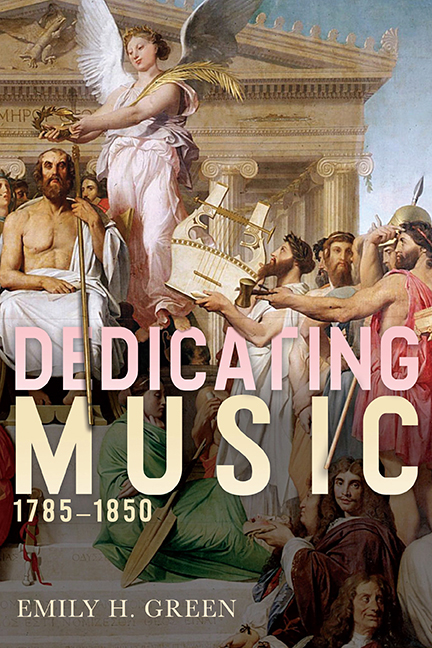Book contents
- Frontmatter
- Dedication
- Contents
- List of Illustrations
- Acknowledgments
- Introduction: Encountering Dedications
- Part One Maintaining Early Modern Models
- Part Two Commodifying the Composer
- 3 Sociability and Celebrity
- 4 Influence, Arrangement, and Authorship
- Epilogue: Dedications and Romanticism
- Appendix: Dedicatory Epistles
- Notes
- Bibliography
- Index
4 - Influence, Arrangement, and Authorship
from Part Two - Commodifying the Composer
Published online by Cambridge University Press: 03 September 2019
- Frontmatter
- Dedication
- Contents
- List of Illustrations
- Acknowledgments
- Introduction: Encountering Dedications
- Part One Maintaining Early Modern Models
- Part Two Commodifying the Composer
- 3 Sociability and Celebrity
- 4 Influence, Arrangement, and Authorship
- Epilogue: Dedications and Romanticism
- Appendix: Dedicatory Epistles
- Notes
- Bibliography
- Index
Summary
Nature is a work of art, but God is the only artist that exists, and man is only an arranger with bad taste.
La Nature est une oeuvre d'art, mais Dieu est le seul artiste qui existe, et l'homme n'est qu'un arrangeur de mauvais goût.
—George Sand, preface to François le ChampiIf only Beethoven's elaborations on “Ein Mädchen oder Weibchen” hadn't been as wild and Mozart's theme so unapproachable, a reviewer in 1799 might have found reason to praise the variation set:
That Herr van Beethoven is an accomplished pianist is well known, and even if it were not known, one would be able to surmise it from these variations. Whether he is equally successful as a composer [Tonsetzer] is, however, a question that it would be difficult to answer in the affirmative, judging from these samples of his work. This critic does not mean to say that some of the variations did not have a certain appeal for him. […] But Herr B. was less fortunate with the variations on [“Ein Mädchen oder Weibchen”], which contain clumsy, harsh modulations that are far from pleasing.
The reviewer concludes by giving Beethoven composition advice, suggesting that the composer choose better themes in the future, especially recommending those by Haydn, which are “simple and easily comprehensible, beautifully rhythmic, not vulgar, and potentially a further education in melody and harmony.” Ultimately, the review is a judgment of Beethoven “als Tonsetzer”— above all, of his taste, which he apparently squandered on a poor theme and all-too-involved embellishments.
The reception of arrangements, variation sets, potpourris, and similar multi-voice works marked a gradual shift in musical culture of this period; they were reviewed (and advertised) in a way that acknowledged collaboration but increasingly reinforced the skill and reputation of a singular creator. Vestiges of an older attitude toward shared work allowed for and praised multiplicity at the same time that a new kind of composerly authority emerged as a force on the marketplace. Dedications demonstrate the two sides of this shift in the way they perform the two last functions that are the focus of this study: they communicate influence and authorship. Dedications have so far been examined as a locus for models of exchange, promotion, and biography.
- Type
- Chapter
- Information
- Dedicating Music, 1785–1850 , pp. 138 - 173Publisher: Boydell & BrewerPrint publication year: 2019



